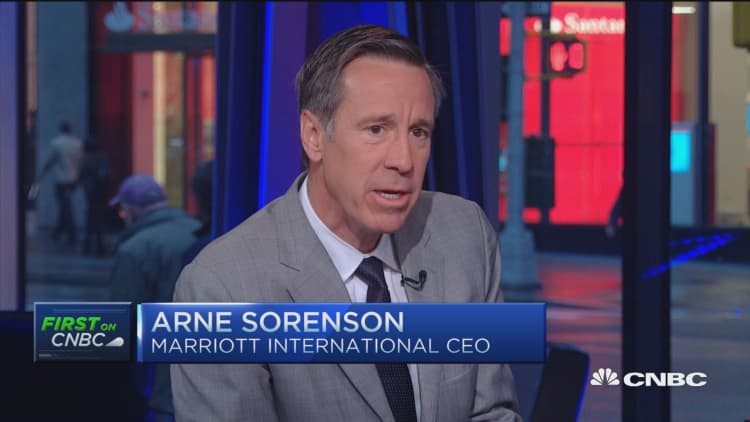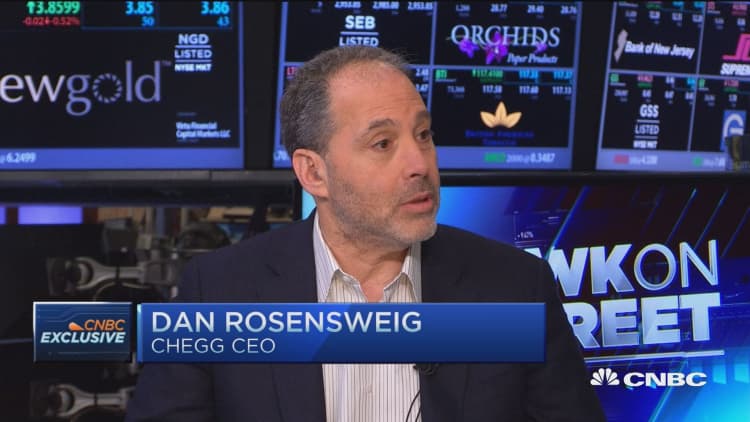CEOs don't typically like to take on politicians unless it's over taxes and regulation, but that approach could leave many corporate leaders out of step with the nation.
The ongoing controversy in North Carolina over a law viewed by many CEOs as discriminating against the LGBT community makes clear the rise of the CEO social activist: taking a stance on diversity is essential to workforce talent recruitment and retention, and ultimately market growth and earnings.
"There's a very interesting change in the current generation of CEOs," said Luke Visconti, CEO and founder of DiversityInc, which just released its annual index of the 50 most diverse companies. "They understand that offering no comment or opinion is a negative one. ... What I tell companies is to be purposeful about outbound communications and be ahead of the curve."
DiversityInc measures corporate diversity using representation on a board, in upper management, among top earners and across many corporate department and initiatives that support employee diversity, including mentoring and resource groups on specific issues.
Visconti said while its rankings can't measure a CEO's stance on a political controversy, "there's more activism to come."
Arne Sorenson, CEO and president of Marriott International (No. 9 on the DiversityInc 2016 list), has been among the CEO "activist" leaders. In one of the first state-level battles over legislation perceived as discriminatory, in Arizona in 2014, Sorenson was among the CEOs to vocally challenge then-Arizona Governor Jan Brewer. Brewer vetoed the legislation.
Now Sorenson finds himself in the middle of the controversy again.
"I have personally received hundreds of emails in the last week complaining about the position I have taken with respect to the law in North Carolina," he told CNBC. "I think the way the law was passed was trying to drive a wedge between people who think and believe different things, as opposed to building a bridge. We end up creating a polarized and exclusionary environment with laws like that," Sorenson said.
DiversityInc Top 10
- Kaiser Permanente
- Novartis
- EY
- AT&T
- PricewaterhouseCoopers
- Sodexo
- MasterCard
- Johnson & Johnson
- Marriott
- Prudential
The politics tied up in the North Carolina law debate should not mean it is viewed as only a political issue for corporations.
"People don't just go to work from nine to five anymore. They are expected to have a huge relationship with the corporation way beyond punching a time clock. It's about protecting workers. Political issues are social issues and are completely relevant to people walking in the door to work every day," said Julie Goodridge, president and founder of socially responsible investing firm NorthStar Asset Management.
Sorenson said the ultimate goal is looking at the success of a campaign like the anti-LGBT discrimination effort and asking whether it can be duplicated in another area related to social change and a change in the business world that helps a company grow.
"I think, in many circumstances, you can have a debate over whether business has much influence, anyway, particularly in a society which has cynicism and divisiveness. But rather than be skeptical, when it's germane to our businesses, we should have an active role in addressing it," the Marriott CEO said. But he stressed, "That doesn't translate into an obligation that business leaders should speak out on every social issue."



The DiversityInc Top 50 has highlighted a finding that is gaining more empirical support among investors: The performance of the 50 companies in the index has beaten the stock market in the past three- and five-year periods (it did not in the past one-year period). But that's just a piece of a more complex CEO performance matrix.
"Diversity is important not because a company checks all the boxes, but because the world is diverse and because consumers are diverse and not becoming any less diverse," Goodridge said.
As an investing CEO who uses screens like gender and LGBT policy as a way to evaluate companies, Goodridge said she is not immune from the problem all CEOs face. "What's missing — the big, most important thing — is, are these companies protecting employees and adding value to the world in some way? Or are they meeting minimal requirements for goodness? One woman on the board or one woman of color won't make a difference."
Some critics of the North Carolina law and related state efforts say it may prove to be an outlier among social issues that inspire CEOs due to its "blatant" nature.
"Some of the activism is just around the audacity of it, the blatant discrimination of it all," said Beck Bailey, a spokesman for one of the most well-organized nonprofit groups fighting the issue: the Human Rights Campaign.
Or as Goodridge put it: "What's happening is, people realize how ridiculous it is."
There's also a legal reason why this issue has attracted so much attention from businesses: while federal laws exist related to race and gender discrimination in the workplace, there is no federal law covering private workplace discrimination based on sexual orientation or gender identity. In 29 states, there is no law that explicitly prohibits discrimination based on sexual orientation, and in 32 states, no similar law that covers gender identity, according to HRC data.
"Sometimes politicians can be regressive," said Stephen Howe, US chairman at EY (No. 3 on the DiversityInc list). "The business world here is moving us forward by being more progressive. ... We're now employing 215,000 people around the world, so we're a significant employer in all markets and we need to be engaged on these issues. ... There is a responsibility that business has in the political and social sphere."
HRC's letter to North Carolina's governor was signed by 160 CEOs, including 10 of the 50 companies on the DiversityInc 50 for 2016.
There's a very interesting change in the current generation of CEOs. They understand that offering no comment or opinion is a negative one.Luke Viscontifounder and CEO of DiversityInc
Goodridge is concerned that making it onto lists like the DiversityInc 50 and signing letters, while steps in the right direction, may allow companies to stop short of being truly effective in pushing for societal changes.
"A CEO's most important role is to set the tone for a company and make sure employees are safe and customers are happy and earnings are up," said Goodridge. "This shows a CEO who is standing up and standing out around corporate values."
But she is pushing for corporate responsibilities related to these issues to evolve in the direction of more concrete reporting and actions. Goodridge's investing firm has just filed a resolution for the annual meeting of FedEx that would require FedEx to produce a report by 2017 on how anti-LGBT laws state to state would impact its business and workforce. NorthStar is a FedEx shareholder, and Goodridge said the logistics company has a good track record on these issues, but the current environment — especially in FedEx's home region of the southern U.S. — requires the company to now go further than it has gone before.
"No one has asked these companies to report on the actual impact this legislation could have on their LGBT employees in-state," Goodridge said. "There will be five more years of this, more and more states," she said.
Goodridge said she believed the FedEx shareholder resolution was the first of its kind. "We just made it up. We needed to get at it; it's a critical issue right now. And it's not a political thing; it's about the lives of employees."
A FedEx spokesman said the company could not provide any comment on the just-filed resolution and referred to a statement in the company's 2015 annual report: "We are committed to providing a workplace where our employees and contractors feel respected, satisfied and appreciated."
— By Eric Rosenbaum and Sonam Sheth, CNBC.com
For complete coverage of the DiversityInc 50, click here.





